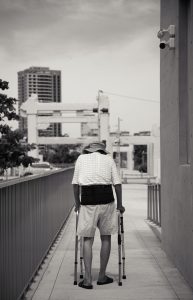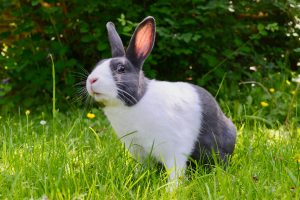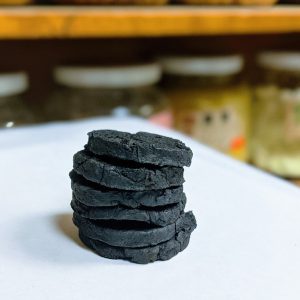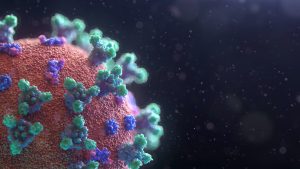Traditional Chinese Medicine
The “Unresolved Exterior Pathogen”

I think one of my favorite concepts in Chinese Medicine is that of the “unresolved exterior pathogen.” What does it mean? When we catch a cold, whether bacterial or viral, most cases should be vented, sweated out, while we rest as much as possible and consume warm foods, such as the classic chicken soup to support our “wei qi,” or immunological cellular energy.
Obviously most modern people do not do this. We take over-the-counter cough suppressants, congestion suppressants, anti-pyretics, and every other suppressant to make us feel as comfortable as possible until the cold resolves… or at least appears to.
This is a totally understandable mistake. First of all, most people don’t know that Chinese Medicine can treat the common cold (along with nearly everything else under the sun), and even if they did herbalists and herbal medicine are not readily available to most.
From a Chinese Medical perspective when a cold is suppressed it gets pushed deeper into the body, from the “wei qi” or immunological layer, to the organs and metabolic layer. Anyone have digestive issues since having Covid-19? This is an “unresolved exterior.”
More common symptoms of unresolved pathogens include rheumatological, dermatological, or orthopedic; autoimmune joint pain being the most self-explanatory, which makes orthopedics not far behind it. Lingering “dampness,” residual plaques or mucus from an exterior pathogen go latent, and if we’re lucky enough that they don’t create the kind of molecular mimicry to over-activate our immune system they may lodge into our muscles, tendons, and ligaments. While neck and back pain during a common cold are well-known, pay more attention to such symptoms that linger in their wake. It usually indicates fluids that should have been sweated out are trapped wherever we happen to be orthopedically most vulnerable.
Thankfully, we’ve gotten to a point where few people are any longer terrified or paralyzed by Covid-19. Most of us are more or less going about our lives taking varying precautions—this doesn’t mean we cannot at the same time respect our opponent.
After I had Covid I continued to consult and get treated by mentors for at least one month after symptoms resolved, with the obvious intention of prevention and full resolution, not just from a biomedical standpoint, but from a more neurotic, perfectionist Chinese Medical assessment. I wanted to ensure that my tongue looked like my tongue again—also that we took steps to avoid any of my own constitutional proclivities from rearing their heads as a result of any unresolved inflammation.
While going through Chinese Medical school it was fascinating to think that my eczema and ski conditions that I’d had all my life may have been a result of an improperly treated cold I had as a baby. Or to view my low back or knee pain as not something relegated exclusively to the orthopedic surface and/or old athletic injuries, but connected to my systemic inflammation. I beg your pardon for my broken record tendency in refutal of one my greatest pet peeves:
“Holistic” does not mean everything alternative, “New Agey,” nor related to spa treatments, nor gentle or weaker than biomedicine. It means analyzing all symptoms and systems as interconnected and the incredibly more challenging task of treating accordingly.
To schedule a FREE INITIAL CONSULTATION CLICK HERE
Happy New Year of the Water Rabbit!

This week marked the first of the lunar new year. To contrast last year’s more rambunctious energy of the tiger, we now enter the year of the “Yin Water Rabbit,” which bodes to be gentler, more harmonious, healing and peaceful.
The rabbit is known to be resourceful, which is why the Chinese believe the year of the rabbit to be financially promising. The rabbit is equally thought of as relatively sensitive, diplomatic, and homemaking, which makes 2023 a potentially great year for family affairs of all kinds, whether baby-making, baby-raising, purchasing homes, or staying at home more frequently to nurture loved ones. The fact that the element in this rabbit year is of yin water only further solidifies these recommendations or themes.
With that being said, it is always important to recognize that the qualities that create our own strengths are generally at the root of our challenges or weaknesses as well. People with a lot of energy or charisma are often poor sleepers, more irritable, and temperamental, all of which a result of their internal heat; while those who are calmer and more laid back have a tendency to laziness and procrastination. They tend to be the colder body/mind types.
Because the yin water rabbit is so naturally peaceful and forgiving, its year’s potential side effects worth being mindful of mitigating are depression and reclusiveness. Of course, we should take advantage of the rabbit’s strengths, of looking inward, meditation practices, and confronting our fears and feelings. At the same time, while immersed in yin water it is important to periodically generate fire, our yang energy to balance this energy around us.
Basic ways to do this are taking trips whenever possible, connecting with community as much as possible, and exercising to raise your body temperature, provided that exercise isn’t something already being done to excess. Regularly partaking in such activities should nicely balance the Yin Water Rabbit’s tendency to melancholy and/or anxiety this year.
For my part, with a yin water year beginning in the middle of winter (as the lunar year always does), I have been using a great deal more moxibustion in the clinic lately. The mugwort herb we burn on certain acupuncture points has a warming, healthy vasodilatory effect, which can be wonderful at preventing pathogenic yin, or local “dampness” in the body. While it’s fine to use in the summer, I feel logically more drawn to moxibustion in the cold of January, especially now in the days of the rabbit.
Food as Medicine
Mama Always Said: You Are What You Eat
Maybe mom really did know best when it came to nutrition. As research has shown, what we eat can actually impact our health profoundly. Over the years, we have learned that our dietary choices can influence our risk of disease. And some have made it a profitable business to teach us new ways to look at food (anti-inflammatory diet, Keto, heart healthy, etc.). continue reading
Red Meat and Foxglove Root as Medicine

In my last weekend roundtable of case discussions with my group in Beijing, my teacher reminded us of the importance of sometimes inquiring how patients feel while digesting red meat. Whether they feel good, bloated, constipated, or otherwise, can inform us of the strength of the microbiome.
Red meat, like all foods in Chinese Medicine, is medicinal, but like any medicinal it is not perfect. Although there is no better food for building and nourishing the blood and body fluids, plus warming the overall gut, red meat is obviously a heavy material, more difficult to digest than most foods, and therefore should be dosed and prescribed mindfully.
This reminded me precisely of how we think of “shu di huang,” a Chinese herbal medicinal that is better known in the west as foxglove root. Foxglove root is one of the most important herbs in our pharmacopeia for building and nourishing blood—especially when the lack of blood has led to internal heat in the body.
The problem is if you look at raw foxglove root it looks like a stale old chocolate brownie. It is dense, heavy, and sticky, invaluable to certain patient patterns, but also difficult to digest; we are continuously reminded to not prescribe unless and until patients’ microbiome functionality is fully, or close to fully restored. It’s a rather simple connection: If someone feels bloated or distended after eating red meat they cannot yet handle foxglove root. If we make the mistake of prescribing it, they’ll likely come back complaining of worse digestive issues and no improvement of symptoms. We always must first rectify the gut before rebuilding blood. This is Chinese herbal medicine in a nutshell—or a stale brownie if you will.
We are now entering the time of year where red meat is most advisable, utilizing its sweet warming properties to balance the bitter cold of winter, as well as its fatty lubrication to counteract the dryness most evidenced on our skin or chapped lips.
However, it is important to dose properly—also whenever possible to intelligently design the remainder of each “formula,” which is to say plate of food. Since something like salmon is relatively easy to digest it can be consumed alongside more carbs and/or potatoes. On the other hand, red meat is better harmonized by cooked greens and light vegetables to aid in its downward movement. Beer and white bread will obviously have the opposite effect.
By all means take the following Eastern recommendations with a grain of salt (or pinch of sea salt atop your filet mignon this holiday season):
- Ideally, red meat should make up the smallest portion of food on your plate. When it doesn’t it’s important the following day to drink plenty of mint, barley, and/or ginger tea to help with its processing and digestion.
- Red meat might be consumed about once a week in summer months and three times a week in winter months.
- Red meat should be consumed more by people over the age of 60, women on their menses, and people with relatively “cold constitutions,” that tend more to anemia, hypotension, hypothyroid, and almost “hypo” anything.”
- People with warmer body types with tendencies to “hyper” conditions, or dealing with serious hemorrhoids or intestinal inflammation should mostly avoid red meat until said symptoms are resolved.
- Red meat can be consumed with reckless abandon by any woman less than six months post-partum and almost any woman trying to get pregnant. If it bothers your stomach I would advise starting with very tiny portions and gradually increasing the dose, as unlike foxglove root, red meat should strengthen the microbiome enough to tolerate more of it.
If you are a meat-eater and have never been to Quality Meats in Manhattan I’d highly recommend! My father always preferred The Palm II on 2nd Avenue, but I believe he was guilty of nostalgic attachment, as it was located a few blocks from his office of several decades.
My Own Covid Story

When my wife texted me two Friday nights ago that she’d had a persistent cough throughout the day, juxtaposed to the emoji for concern and/or terror, I was unperturbed. Over the course of the now close to three years into this pandemic, we’d both seen this play enacted by one another many times over. A cough, a headache, a tickle in the throat or oddly stubborn congestion, and like any typical urban, Jewish medical professionals we immediately grasped for one of our many rapid Covid tests in the closet, crossed our fingers, and hoped for the best; and were always rewarded as such—that was up until last week.
My wife continued to test negative for her first 24 hours, even as symptoms were worsening: Headache, body aches, fatigue, all to the severity that she figured if not covid it must have been the flu. Regardless of the biomedical disease label, her Chinese medical pattern was her Chinese medical pattern, so I dutifully drove to the pharmacy in Chinatown to get her what I hoped was the perfect formula. By the 48th hour she tested positive, just at around the same time she’d begin her herbs and self-quarantine. We only hoped it wasn’t too late for the baby and me.
I felt fine for another two days, playing Super-Dad, cooking all meals plus Chinese herbs, caring for the baby, and leaving meals on the floor outside of the dreaded infected room. Unfortunately, once woken in the night, our 15-month-old refuses to return to sleep without the comforts only Mom can provide. They ended up spending the night together and within another 48 hours I had a tickle in my throat so subtle that three years ago, or even three days ago I would have thought nothing of it. A mild cough that could have just as easily been the kind of mild seasonal allergy symptom exhibited by those of us lucky enough to not much suffer with seasonal allergies. Hoping against hope that maybe it was psychosomatic or even a stretch of a coincidence, but within six hours I was writhing on my bed with a 100.4 fever (not terrible), plus a cough and rather heated oppression in the chest. Still testing negative, but immediately emailed one of my mentors for a virtual consultation the following morning.
My first twelve hours were rather awful: One of the worst occipital headaches I’d ever experienced, low back pain that was reminiscent of after my Covid vaccine, and a queasy lack of appetite that is as foreign to my own constitution as it is to most common colds. Covid’s unique strength is in the sticky nature of the spike protein, “damp” as we’d coin it in Chinese medicine, obviously evidenced in its well-known cerebrovascular and gastrointestinal complications, as well as brain fog, which can all be explained by either modern psychoneuroimmunology and/or good old fashioned, Chinese medicine. The muscle aches, for example, are the excess body fluids on the surface fighting the pathogen but temporarily losing, as is apparent by the lack of sweat I was still experiencing.
My brother was my angel, kind enough to use his free time to run to Chinatown for me, pick up the formula written by my mentor, and drop it off at my building, so that I wouldn’t lose a day. Covid is the kind of disease that evolves rapidly, entering the body at one “organ level” but quickly traversing to the next if not immediately and appropriately addressed. My brother understands just enough about Chinese medicine to know this logic, so I needn’t explain to him the urgency, in spite of well knowing mine was not an “urgent” case by biomedical standards.
By this time my wife was 80% better, the baby practically asymptomatic aside from some odd eating and sleeping habits. I felt much better by my 24-hour mark, though my “pattern” did shift, as the headache and muscle aches had abated and I was left with a burning sore throat. I called my mentor for another consultation, as we had to change the formula, this time with an intention of clearing heat from the lungs. Once that was clear I was finally left with a low-grade brain fog for a few days, which was resolved with formula #3, a return to more aromatic herbs to dry the leftover fluid retention in the gut. No, I did not request my brother make any more trips to Chinatown, as I felt up to driving in myself, requesting they bring my bag of herbs outside to exchange safely on the sidewalk.
All told, it was approximately a one-week process for myself, probably a bit shorter for my wife, and a lot shorter for the baby, and I thought it all too appropriate to not share, doing what I do for a living, and this all having fallen the week before Thanksgiving.
We have much to be grateful for through this experience, first and foremost of course being our health and full recovery. While I realize the majority of the western world has been “over this” for quite some time, and the present variant is supposedly mild, I suspect the latter hypothesis to be applicable mostly to those who are on their second or third times around. For our household this was our first—we were naïve enough to believe we might even evade it—and although we managed, it was no fun going through it with a 1-year-old. Though we made it through, and to this end my primary gratitude goes to Kamwo Pharmacy, of course my brother, and Chinese medicine in general; while the western world continues to box acupuncture in as some nifty new age modality to treat muscle pains, at its inception it is the most thoughtful form of internal medicine, and all of its classical literature is more or less wholly dedicated to illnesses like coronavirus. I hope should any of you contract it in the future you’ll allow me to help first.


